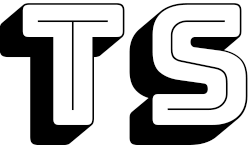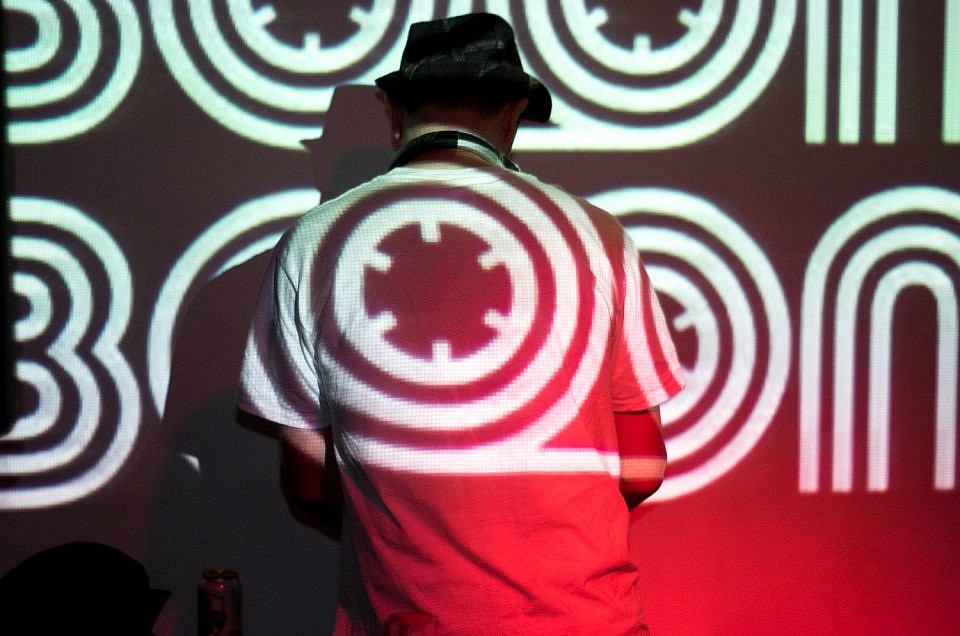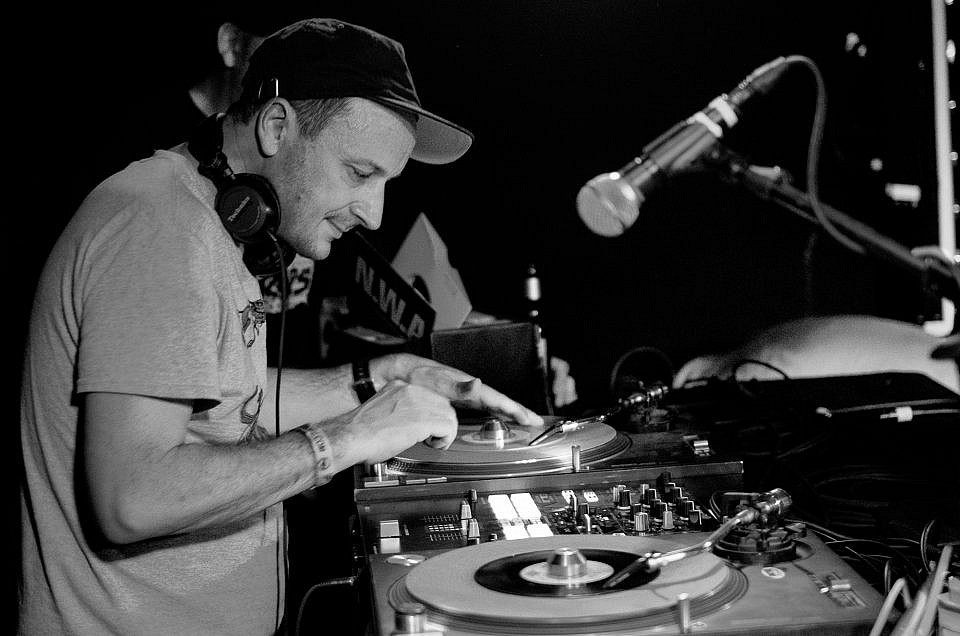Boca 45 aka has toured the world djing, he has walked away from a major label contract for reasons of artistic integrity, his music was featured on the soundtrack of Banksy’s mockumentary Exit through the Giftshop, and that’s not even half of his cv. Let’s find out more about him.
You were born and raised in Bristol, right?
I’ve been in Bristol my whole live. I grew up in an area code which was BS 4 and then I moved to BS 3 for a bit but now I’m back in BS 4. Although I’ve always lived within a two or three mile radius, I’ve been really fortunate to have seen a lot of the world through djing. I don’t feel like I have missed out on anything; Bristol is a good place for music and the arts. It’s a creative place and I feel lucky to have grown up here. When I started djing in the early nineties, the whole Bristol thing was just blowing up! Seeing all that stuff unfold was totally inspiring. Even before that, even before people internationally would have known about Bristol, there was always a strong kind of b-boy scene.
Did you grow up on the Wild Bunch and all that?
I was a bit young for the Wild Bunch but I did go to one of their jams at the Arnolfini, an arts center, in around ‘85, ‘86. I would have been only ten or eleven, maybe twelve. I remember being at that jam.
I was completely immersed in the whole thing. Even at that young age I felt it was everywhere. Maybe it was just Bristol. It certainly was with me and my friends and all we knew as ten or eleven-year-olds was Electro records- it was just Street Sounds Electro. We knew that the whole thing was hip hop and it was rap but we just knew it as electro music. And all these tracks kind of went into each other: so if you got Electro 5, you kind of knew that there were three tracks on every side (‘cause it was the vinyl that we really wanted, obviously.) This planted a seed in my head and even though I didn’t get my first decks until I was fifteen or sixteen, I was still aware that these tracks went into each other and that was kind of magical. As magical as the actual music which was something that you’d imagine to be from out of space. It was so incredible and inspiring! That whole Street Sounds Electro thing paved the way for virtually everything I have done. I remember one Christmas where I said to my mum all I wanted was the Electro albums which I didn’t have. She only got me one of them and I remember crying the whole Christmas!
Lino outside of the chip shop, breakdancing with your mates, trying graffiti out in my dad’s garage… I was completely into the whole thing. I suppose as you get into your teens, you find other things that you are into as well, like, football and girls and everything else. But once I got my decks, I was totally back in again. Being in Bristol it seemed like everybody was into it as well. When I went to senior school, the kids worth knowing were the b-boys, the ones who were into hip hop, the ones who knew the electro albums. It was like having your stripes. “He’s alright ‘cause he knows how to do a backspin” or he’s got Electro 3 on a cassette or whatever… I was totally blown away by it and I still love those albums now.
Judging from your dj sets, your taste has broadened a lot over the years.
It all started with hip hop but probably after the whole Def Jam, Public Enemy, LL Cool J sort of thing I got into other stuff as well. At the time, I wasn’t really aware of the stuff that hip hop was sampling, the funk and stuff. I got into other kinds of music: the Beatles and more kind of sixties stuff and I got into indie through that as well. I was still really into hip hop but I suppose my palate was broadening even then. That was the late eighties and into the early nineties. I loved the whole 3 Feet High and Rising and Paul’s Boutique, those sorts of albums. Those were the interesting records for me. I suppose I was getting more into the “Technicolor hip hop” because I was into Sgt. Peppers and Pet Sounds and records like that. They kind of made sense. A record like Odelay by Beck was a brilliant record for me. It’s the Dust Brothers who made Paul’s Boutique who made that record! It’s a perfect record. I was getting into slightly different stuff in the late eighties, early nineties and then coming back into hip hop with the Tribe Called Quest records. The first Pharcyde record was a massive record for me. Digable Planets, things like that. That was when I properly started getting back into hip hop again and djing with it. Then the whole soul and funk thing connected with that because a lot of the djs that I looked up to in Bristol would play hip hop but they would all play jazz as well. They’d play soul and funk and bits of disco. That was really informing my taste. There were lots of styles by that point. My dj sets have never really changed too much in style since then. I like playing all those styles and making something cohesive out of it.
I always think of the music that I like as organic music: hip hop, funk, soul, jazz… I’ve never really got into techno, house, drum and bass, none of that stuff. I think I play enough styles of music to warrant a decent night; there’s enough to keep me interested.
I do like my jungle. But the way I look at it, a lot of it is just a different version of reggae.
The reason why I was so anti the whole drum and bass thing from the off was because I worked in a record shop from 1995 until 2000. The drum and bass customers were always really tricky. So I just thought of the music as “tricky customers.” All they would ever want was promos whereas the hip hop customers and people like myself would want the albums and the twelve inches. We were after the finished product. We wanted the ones with the spine so that you could see it in your collection. The drum and bass guys they would just want the promo. As soon as it came out on Metalheads or whatever, they’d just go “not interested!” It just seemed crazy to me. That put me right off drum and bass.
It’s funny how collecting records has changed since those days. I remember how one would always pass test presses and 45s if there was a 12” in a proper sleeve.
I always collected 45s but I passed up on a hell of a lot hip hop 45s for exactly the same reason. I djed with Ollie Teeba the last weekend and he said that he used to work in a mainstream shop and he used to get offered hip hop 45s by the label reps and every time he would go for the twelve inch.
I would love to have a lot more hip hop sevens.
Crazy money right now, though…
Really stupid money. Especially some of the ones which I picked up for next to nothing. British presses… I think it’s never a hundred quid record… But there you go, it’s supply and demand.
I won’t get into that. If I find something for cheap, I’ll buy it but that’s about it.
Me too. Good records are good records. Whether they are 20p or 20 pounds, a good record is a good record.
I’d rather buy a pile of records for a hundred pounds than just one.
I agree. Some people are the complete opposite but I agree.
When you first told me about Malachai, it sounded interesting enough to check it out but I didn’t really expect to like it.
It was probably a shock to the system to a lot of people who listened to Boca records and Dynamo Productions before that to hear the first Malachai record. “What are they doing?!”
Gee, the singer, is a really well known mc from Bristol. He’d been around for ages on the hip hop circuit. He was on a Boca track called Down to Mexico and he rapped the verses and in the choruses he sung them. I loved how he did a three way harmony in the choruses and I said to him we should try something with him just singing. I think he was taken back by that.
Malachai was a project which I ran beside the whole Boca stuff. I wrote the first Malachai album almost at the same time as I did Vertigo Sounds. I was djing loads and I did a lot of it while I was out on the road, finishing stuff on my laptop if I was in a hotel room or on a flight. But I didn’t know what to do with it, really, I didn’t know what the plan for it was.
Then I played it to a friend, Geoff Barrow from Portishead. I played him Snowflake, which was actually the first track we had done, and I told him that I didn’t know what to do with it. He was like “play it again!” I thought he was going to give me this critical breakdown of it but he just went “that’s amazing! You’ll have a major deal within six months.” He was right! I think a couple of people have thought that that track was a hit. Well, it wasn’t a hit. It was nearly a hit. That track has done well at radio and it has done well at licensing but it wasn’t quite a hit. I think the reason why they were all flocking around was because they thought it was a big single.
I love that project! It was me out of my comfort zone. Me not making dancefloor music. I love doing that stuff! But this was doing something different using the same process to make it: I was still sampling records and I was still doing things crusty! It’s a similar process.
I think that’s what drew me into it. It certainly is not a hip hop record but at the same time it sounds as much like a hip hop record as such an album possibly could.
That’s pretty much what it was: it was two b-boys making a psyche record with hip hop sensibilities. It’s that simple. But it wasn’t simple for a lot of people to understand though. There aren’t many people like us who would get it. They’d go “Where’s the bass player? Who’s the guitarist?” It’s not like that! At the time the records I was listening to were Edan’s second record, Beauty and the Beat, and Elephant by the White Stripes. I was listening to those albums over and over again. I loved how they worked from start to finish. That’s what I wanted to do with that first Malachai record. I wanted it to be something that you could be wrapped up in for… Well, it’s a short record… All of my records are short. I don’t think you have to elongate things too much.
The worst thing about the introduction of cds was that you could see the length of an album and people would feel cheated if they didn’t get their 74 minutes of music.
That’s just the worst thing! All of my favourite albums went on one side of a C90. So I’ve always made sure that all of my records would fit on one side of a C90.
All those edits on a twelve which go on for eight minutes or whatever – that just doesn’t do it for me. I’ll cut it up on a seven. You know what I’m like! You’ve seen me dj a lot of times. I’m fast and furious. Get ‘em in, get ‘em out! I like to keep things to the point.
How do you approach production? Smoove once told me that once the beat is done, everything else will just fall into place.
Especially the Boca stuff is very beat laden. But I’d normally start with a vibe – wether that is a sample or a riff that I’ve come up with. That normally is my starting point. A lot of the time it could just be a basic loop and then I’d build it around that. Sometimes that gets taken away and it turns into something else. I don’t think it’s totally about the beat. Not for me, anyway. I always look for a certain type of organic sound, I like to keep things quite crusty. I don’t like anything too clean. I don’t use any of that cleaning up software. If it’s got a pop in it, it normally stays. It’s all part of the vibe for me.
It normally starts with a vibe and then it gets build upon. I will play stuff around it, maybe get people to play on things, get a vocal in… It becomes kind of like a puzzle. I often take things away once the vocal is in because it gets to busy. Less is more is always something worth considering. It doesn’t have to be layered to the max.
Let’s pick one track from your new album. What was the the vibe you were going for on Lafayette Afterglow?
That was initially a beat. It was quite a sparse beat and then I layered the beat up and played bass and synths. I played pretty much everything on that track. There’s a guy called Herbie Flowers who played on a lot of the British jazz stuff, he played the bassline on Walk on the Wild Side, and I did that sort of vibe. In fact I called the track Herbie Flowers at first. I wanted a kind of end of the evening, walking home from a club in a bit of a haze sort of vibe.
You already mentioned working on tracks on your laptop while on the road. How much of your music is done on computers?
I still use my MPC. I got an MPC2000 now. I do use Pro Tools. Sometimes it will start on the MPC but then it will normally put to ProTools. I use some compressors and I use an Boss RE-20 which is like a guitar pedal version of a Space Echo. When I started using Pro Tools I was aware that you could end up sounding like everyone else. I use it a bit like I would have used a tape machine, really. As it is quite straight forward, you don’t get bogged down in too much technical stuff. I’m an “get my ideas down quick” type of person. Get them down and start vibing on them. There’s nothing worse than getting something down and then having to get the manual out. I tried other bits of software but Pro Tools just suits me. People tell me that I should be using Logic and this and that but I’m too old for it now. It’s Pro Tools for me. I still use my decks, obviously, I’ve got an 808 which I use as well… For me, it’s half and half, I’d say.
How important is it to you to dj and how much is your production influenced by djing?
For Boca it’s massively important! It’s actually paramount. Djing and producing go hand in hand with the Boca project. One of the reasons why I wanted to do another record was because I started enjoying djiing again.
I really went off of djing a couple of years ago. That might have been because I was doing the Malachai project which never was related to my djing and then the Dolman project which wasn’t connected to djing either. I was working in the studio all week and for the gigs I was doing internationally, I took a laptop and some sevens as well. That worked out ok as it meant that I could play the newer stuff on a laptop and then get back to playing some sevens as well. But I ended up playing a lot of music that I didn’t really like. Then I did a gig abroad on a big night of the year and the gig was so bad that I felt I was going to give up. I thought that I’d actually hang up my headphones. I couldn’t do this anymore! I had such a good run at it… I actually said to my wife when I came back that I wasn’t gonna dj anymore. It was like a bad relationship that had gone sour.
I was about to announce it to whoever would actually care when I got a phone-call from a guy who runs a local hip hop night to remind me that I was djing the next Thursday. I just couldn’t tell him that I couldn’t do the night, that I had given up djing. So I thought that this would be my swan song. I just took vinyl and I just took hip hop to that night. It was how I remembered nights being when I started out djing in Bristol! It was a really good crowd, really into it, half black, half white. Everyone into the tunes, not asking for stupid things, not having to pander to anybody. I thought “that is it!” I just need to be comfortable in my own skin and play what I want and that is vinyl. That is part of my make-up! Ever since then I’ve started enjoying djing more. I now play eighty percent of my gigs with just sevens, sometimes I take twelves as well. I really started enjoying it again and that inspired me to be getting on with this new Boca album. I realized because of that that this is the yolk of the egg of everything I do. The djing informs all the production that I do and it is something I’m quite natural at. Without wanting to sound big headed, it’s nothing I’ve ever had to work hard at, it comes quite naturally to me. I really enjoy it. The late, late nights at clubs I don’t enjoy so much. It’s just getting later and later but that’s something you have to deal with.
I keep asking Malachai questions event though this interview is supposed to be about Boca. One final thing that just came to my mind, and this is related to Malachai again, – did you ever end up working with Jonny Dollar (the guy who produced Blue Lines by Massive Attack)?
I did. I actually did! When Malachai got signed by Island, they asked what producers I wanted to work with. So I said Prince Paul, the Dust Brothers, George Martin, Rick Rubin and Jonny Dollar. They said they were all out of the question except for Jonny Dollar and you wouldn’t want to work with Jonny Dollar because he was a nightmare. At that point the whole industry had kind of said you just don’t use Jonny Dollar. He made one of my favourite albums of all time! He pretty much made Blue Lines! So I said that I’d at least want to have a go. Our A&R guy at Island got in contact with him and he was quite surprised that anyone was asking him because no-one had asked him for about two or three years. He totally fell out of favour with the music industry as he was quite outspoken by how they were. Gee and I worked on a track with him. I think we worked on How Long which was on the first album. We did a little trial period. It was brilliant. he was such a lovely guy! I learned a hell of a lot just by being sat in a room with him! He was a totally inspiring guy and he had brilliant stories. Just the way a producer should have been. Unfortunately, the way that the music industry has gone, his kind of type… He was a bit of a drippy hippie. Although I’m not a drippy hippie, I liked his vibe. Not a lot got done. I loved working with him and it was a fantastic experience. I really look back very fondly on the couple of weeks that I spent working with him and I was devastated when I learned that he passed away. It was a great thing to have done!
Nothing ever got released from those sessions, though?
No. But I’m very glad I did it. Such a super talented guy who is very sadly missed.
One of Boca 45’s latest projects is 45 Live, a website and agency dedicated to small seven inch records and the people who play them. Check it out here!
For more info on Boca and his various projects have a look at his website.




%20Tim%20Schnetgoeke-960x636.jpg)